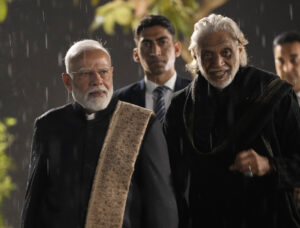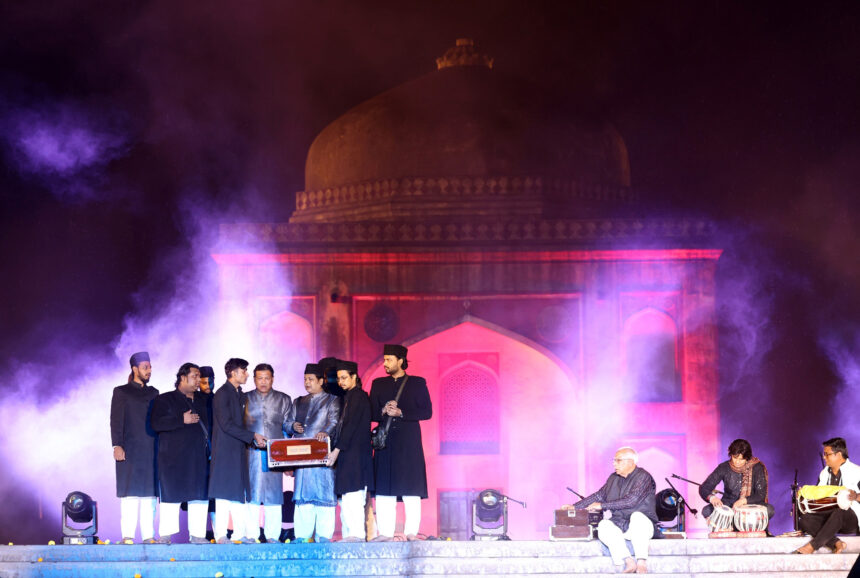NewzVille Desk
“It was natural to feel elated in the presence of the rich legacy of Hazrat Amir Khusro.” Prime Minister Narendra Modi said this while participating in the Sufi music festival, Jahan-e-Khusro 2025,on 28 February 2025, at Sunder Nursery, New Delhi. The essence of the Spring season, which Khusro was so fond of, is not just the season but is also present in the air of Jahan-e-Khusro today in Delhi, PM noted.
Organized by the Rumi Foundation, the Festival, started by renowned filmmaker and artist Muzaffar Ali in 2001, will celebrate its 25th anniversary this year and is being held from 28th February to 2nd March. It is bringing together artists from across the world to celebrate the legacy of Amir Khusro. Jahan-e-Khusro 2025 is an international Festival dedicated to Sufi music, poetry, and dance.

The Prime Minister remarked that the Jahan-e-Khusro event carries a unique fragrance, representing the soil of India. He recalled how Hazrat Amir Khusro compared India to paradise, describing the country as a garden of civilization where every aspect of culture has flourished. “The soil of India has a unique character, and when the Sufi tradition arrived here, it found a connection with the land. The spiritual teachings of Baba Farid, the love ignited by Hazrat Nizamuddin’s gatherings, and the new gems created by Hazrat Amir Khusro’s verses, which collectively embody the essence of India’s rich cultural legacy”, Modi remarked.
The Prime Minister emphasized the unique identity of the Sufi tradition in India, where Sufi saints blended Quranic teachings with Vedic principles and devotional music. He praised Hazrat Nizamuddin Auliya for expressing unity in diversity through his Sufi songs. “Jahan-e-Khusro has now become a modern reflection of this rich, inclusive tradition”,PM Modi stated.
Prime Minister Modi highlighted that the civilization and culture of any country get their voice from its music and songs. “When Sufi and classical music traditions merged, they gave birth to new expressions of love and devotion, evident in the qawwalis of Hazrat Khusro, the verses of Baba Farid, the poetry of Bullah Shah, Mir, Kabir, Rahim, and Ras Khan. These saints and mystics gave a new dimension to devotion”, he added.
PM Modi noted that whether one reads Surdas, Rahim, Ras Khan, or listens to Hazrat Khusro, all these expressions lead to the same spiritual love, where human limitations are transcended, and the union between man and God is felt. “Ras Khan, despite being Muslim, was a devoted follower of Lord Krishna, reflecting the universal nature of love and devotion, as expressed in his poetry. The grand performance at the event also reflected this deep sense of spiritual love”, Modi underscored.
Modi spoke about Hazrat Amir Khusro, who is famously known as the ‘Tuti-e-Hind’. He highlighted that in his works, Khusro praised India’s greatness and charm, as seen in his book Nuh-Siphr.
The Prime Minister emphasized that Khusro regarded India as superior to the great nations of his time and considered Sanskrit the best language in the world.
Modi acknowledged that Khusro respected Indians as being greater than the greatest scholars.“Khusro also took pride in how India’s knowledge of zero, mathematics, science, and philosophy spread to the rest of the world, especially how Indian mathematics reached the Arabs and became known as “Hindsa.”,
PM Modi noted. The Prime Minister further pointed out that despite the long period of colonial rule and the devastation that followed, Hazrat Khusro’s writings played a significant role in preserving India’s rich past and keeping its legacy alive.
The Prime Minister expressed his satisfaction with the efforts of Jahan-e-Khusro, which has been successfully promoting and enriching India’s cultural heritage for 25 years. Modi acknowledged that maintaining this initiative for a quarter of a century is no small feat. Prime Minister Modi concluded his address by extending his gratitude for the opportunity to enjoy the celebration and expressing his heartfelt appreciation for everyone involved with the event.





